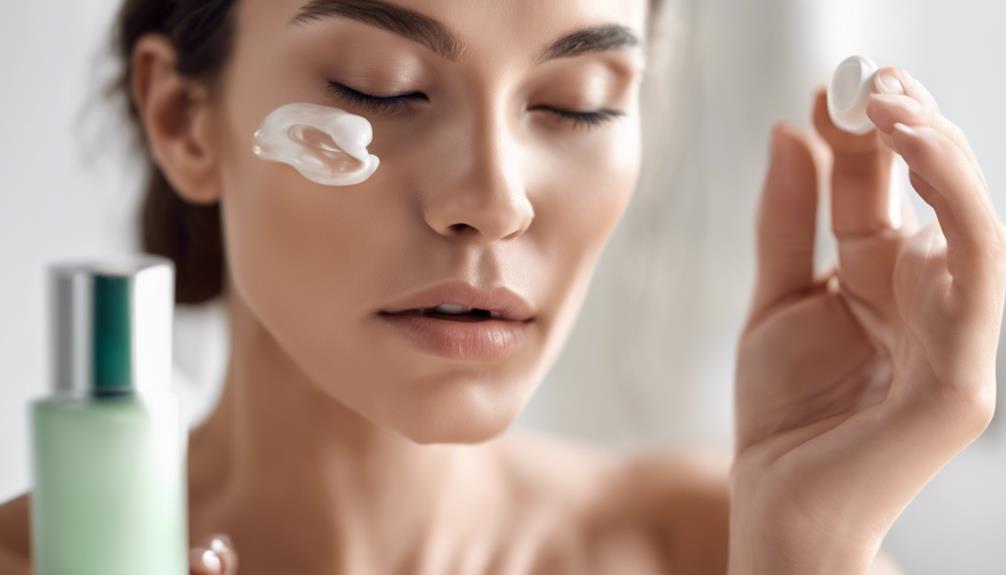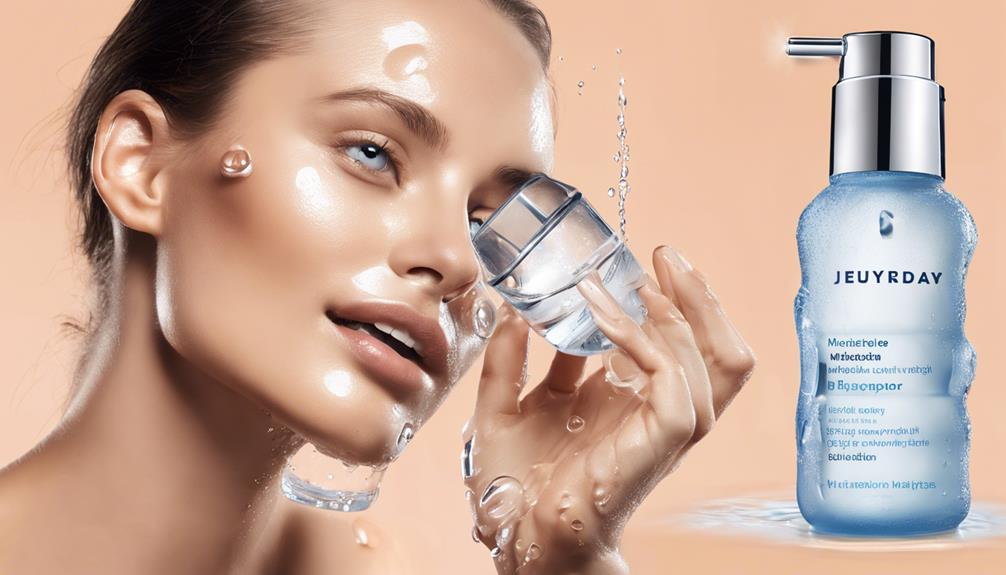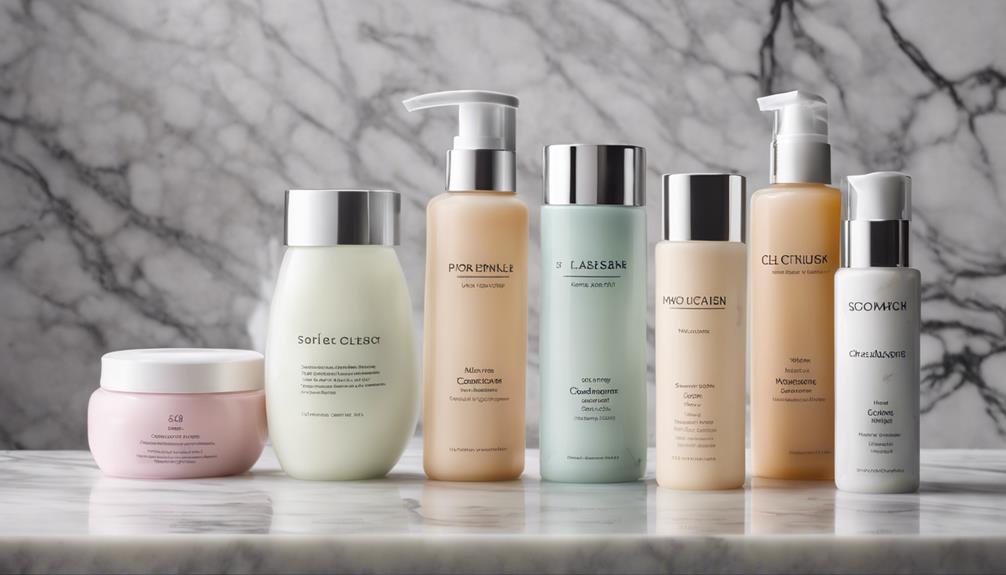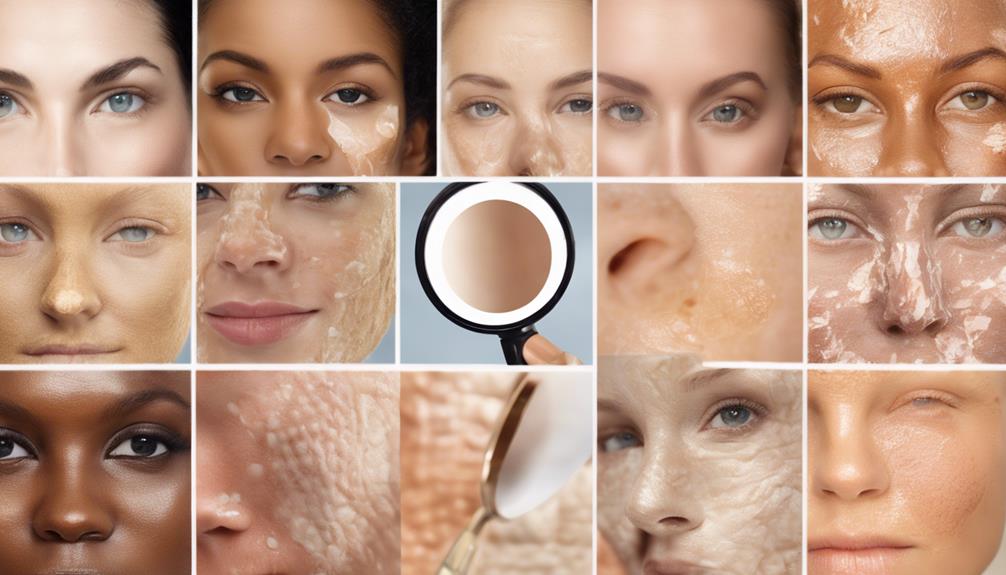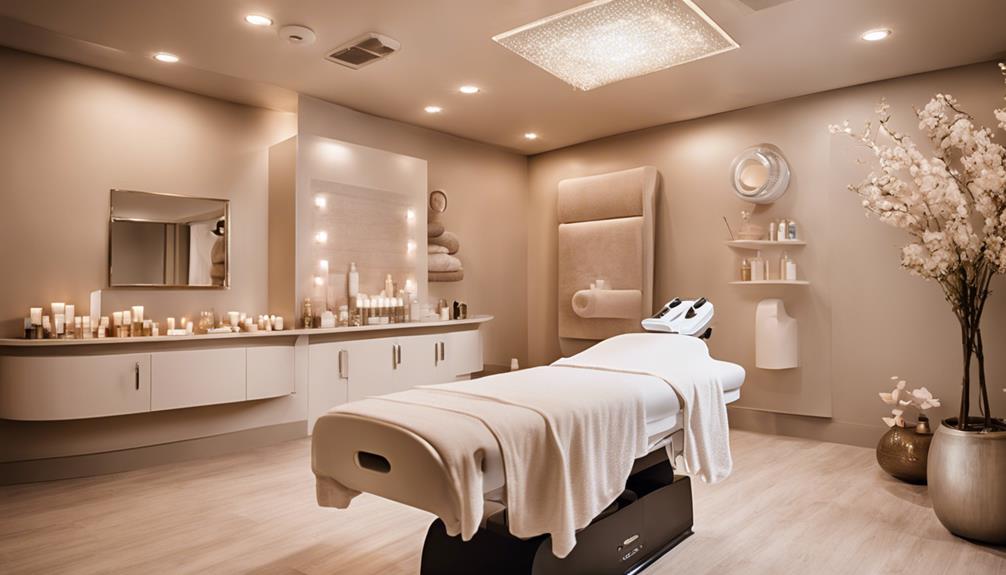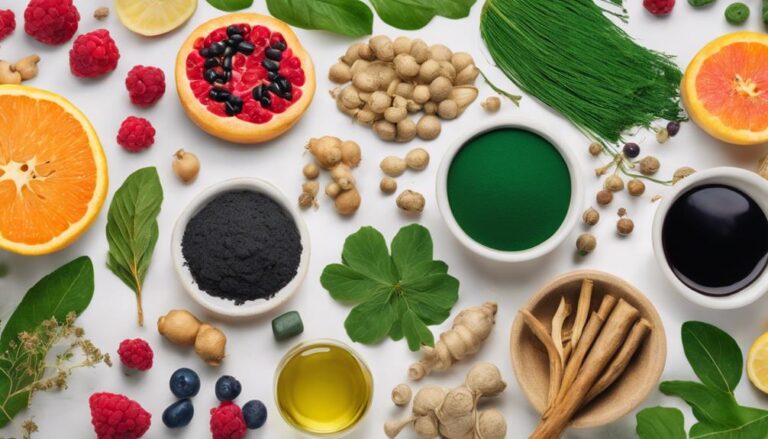How to Improve Skin Texture
If you've ever felt overwhelmed by the vast array of skincare products and treatments promising to enhance your skin texture, rest assured that improving your skin's appearance doesn't have to be overly complicated or costly. By focusing on simple yet effective strategies like incorporating hydration, exfoliation, and antioxidants into your routine, you can make significant strides in achieving smoother and healthier skin. But there's one key element that is often overlooked, and it might just be the missing piece to your skincare puzzle.
Key Takeaways
- Regular exfoliation promotes smooth skin texture and unclogs pores.
- Hydrate adequately for plump, healthy skin appearance and texture.
- Incorporate antioxidants to improve skin texture and reduce inflammation.
- Consider professional treatments like chemical peels for texture refinement.
- Maintain a healthy diet with nutrient-rich foods for skin texture enhancement.
Importance of Hydration
Ensuring proper hydration is crucial for improving skin texture. Water intake plays a significant role in maintaining skin health. Hydrated skin appears more plump, radiant, and youthful. When you drink an adequate amount of water, your skin retains moisture better, reducing the appearance of fine lines and wrinkles. Additionally, staying hydrated helps flush out toxins from your body, promoting clearer skin.
In addition to water intake, using a good moisturizer is essential for skin hydration. Moisturizers work by sealing moisture into the skin, preventing it from drying out. They also help create a protective barrier against environmental aggressors that can damage the skin.
Look for moisturizers with ingredients like:
- Hyaluronic acid
- Glycerin
- Ceramides
These ingredients are known for their hydrating properties.
Benefits of Exfoliation
Proper exfoliation can significantly enhance the texture and appearance of your skin. By incorporating exfoliation into your skincare routine, you can enjoy a multitude of benefits.
There are two main types of exfoliation: chemical exfoliation and physical exfoliation.
Chemical exfoliation involves the use of acids or enzymes to dissolve dead skin cells and promote cell turnover. This method is effective in targeting different skin concerns such as acne, hyperpigmentation, and fine lines.
On the other hand, physical exfoliation utilizes abrasive substances or tools to physically scrub away dead skin cells. It helps to unclog pores, smoothen rough patches, and improve overall skin texture.
Regular exfoliation can help to reveal fresh, radiant skin by removing the buildup of dead skin cells. It can also enhance the effectiveness of your other skincare products by allowing them to penetrate deeper into the skin. Remember to exfoliate gently and not overdo it, as excessive exfoliation can lead to irritation and sensitivity.
Choosing the Right Cleanser
When selecting a cleanser for your skincare routine, it's essential to consider your skin type and specific concerns. To maintain a healthy skin barrier and pH balance, opt for a cleanser that's gentle and suited to your individual needs. Cleansers with a pH similar to that of the skin help preserve the natural balance, preventing dryness or irritation. Look for ingredients like ceramides, glycerin, or hyaluronic acid, which can support the skin barrier and keep it hydrated.
For oily or acne-prone skin, choose a foaming or gel cleanser to help control excess oil production without stripping the skin. Dry skin types may benefit from creamy or hydrating cleansers that provide moisture while cleansing. Combination skin can benefit from a gentle, balanced cleanser that addresses both oily and dry areas.
Incorporating Antioxidants
To further enhance your skincare regimen and promote healthy skin texture, incorporating antioxidants is a beneficial step. Antioxidants play a crucial role in protecting your skin from damage caused by free radicals, which can lead to premature aging and skin texture issues. Including antioxidant-rich foods in your diet such as berries, nuts, green tea, and dark chocolate can provide your skin with vital nutrients to maintain its health and vibrancy from the inside out.
In addition to consuming antioxidants, integrating topical antioxidants into your skincare routine can further boost skin texture improvement. Look for products containing ingredients like Vitamin C, Vitamin E, Coenzyme Q10, or resveratrol, which can help neutralize free radicals, reduce inflammation, and promote collagen production for smoother and more radiant skin.
Sun Protection Strategies
Considering the harmful effects of UV radiation on your skin, implementing effective sun protection strategies is essential for maintaining healthy skin texture. UV exposure can lead to premature aging, wrinkles, and an increased risk of skin cancer. Protecting your skin from these harmful rays is crucial for overall skin health. One key strategy is proper SPF application.
| SPF Level | UVB Protection | UVA Protection |
|---|---|---|
| SPF 15 | Good | Some |
| SPF 30 | Very Good | Good |
| SPF 50 | Excellent | Very Good |
| SPF 70 | Superior | Excellent |
| SPF 100 | Maximum | Superior |
When choosing a sunscreen, opt for a broad-spectrum formula with an SPF of at least 30 for adequate protection against both UVB and UVA rays. Apply sunscreen generously and reapply every two hours, especially when swimming or sweating. Don't forget about areas like your ears, neck, and hands. By making SPF application a habit, you can safeguard your skin and maintain a smooth and healthy texture.
Essential Vitamins for Skin
For optimal skin health and texture, incorporating essential vitamins into your skincare routine is crucial. Nutrient-rich foods play a significant role in maintaining skin health. Vitamins such as A, C, and E are known for their skin benefits.
- Vitamin A helps with skin repair and maintenance, while vitamin C boosts collagen production and brightens the skin.
- Vitamin E is a powerful antioxidant that protects the skin from damage caused by free radicals.
Including foods like leafy greens, citrus fruits, nuts, and seeds in your diet can provide you with these essential vitamins.
In addition to a balanced diet, supplement options can also help ensure you're getting an adequate amount of essential vitamins for your skin.
– Supplements like multivitamins or specific vitamin supplements can be beneficial, especially if you have dietary restrictions or are unable to get enough vitamins from food alone.
However, it's important to consult with a healthcare provider before starting any new supplement regimen to ensure it's safe and suitable for your individual needs.
Understanding Skin Types
Understanding your skin type is fundamental when it comes to crafting an effective skincare routine. Skin hydration plays a crucial role in maintaining healthy skin. Knowing whether your skin is oily, dry, combination, or sensitive can help you choose the right products and treatments to keep it balanced and radiant.
For oily skin, focus on gentle cleansers and oil-free moisturizers to prevent clogged pores. Dry skin types benefit from richer moisturizers and hydrating serums to replenish lost moisture. Combination skin requires a tailored approach, using different products for oily and dry areas. Those with sensitive skin should opt for fragrance-free, hypoallergenic products to avoid irritation.
Developing personalized skin care routines based on your skin type can lead to noticeable improvements in texture and appearance. Experiment with different products and techniques to find what works best for you, and don't forget to pay attention to how your skin reacts.
DIY Facial Masks
To enhance your skincare routine and target specific skin concerns effectively, incorporating DIY facial masks can be a beneficial addition. Using natural ingredients in your DIY facial masks can provide your skin with nourishment and hydration. Ingredients like honey, yogurt, avocado, and oats are popular choices for DIY masks due to their soothing and moisturizing properties.
When applying DIY facial masks, ensure your face is clean and free of makeup. Gently apply the mask using your fingertips or a soft brush, avoiding the delicate eye area. Allow the mask to sit for the recommended time, usually around 10-15 minutes, to let the ingredients work their magic.
Rinsing off the mask with lukewarm water and patting your skin dry gently completes the process. Regular use of DIY facial masks can help improve skin texture, leaving your skin feeling refreshed and rejuvenated. Experiment with different natural ingredients and application techniques to find the best DIY facial mask for your skin's needs.
Professional Treatments Overview
Shifting from DIY facial masks to a more intensive approach, exploring professional treatments offers a deeper level of skin rejuvenation and targeted solutions. Two popular professional treatments known for their effectiveness in improving skin texture are chemical peels and microneedling treatments.
Professional Treatments Overview
When considering professional treatments for enhancing skin texture, options like chemical peels and microneedling treatments stand out. Here's a comparison of these two treatments:
| Treatment Type | Benefits |
|---|---|
| Chemical Peels | – Exfoliates and removes dead skin cells |
| – Improves skin tone and texture | |
| – Helps reduce acne scars and hyperpigmentation | |
| Microneedling Treatments | Benefits |
| – Stimulates collagen production | |
| – Improves skin elasticity and firmness | |
| – Reduces the appearance of fine lines |
Both chemical peels and microneedling treatments can offer significant improvements in skin texture, addressing various concerns effectively. Consulting with a skincare professional can help determine the most suitable treatment based on individual needs.
Importance of Sleep
Adequate sleep is crucial for maintaining healthy skin and overall well-being. Quality sleep not only helps you feel refreshed but also plays a significant role in your skincare routine. Here are some key points to highlight the importance of sleep for your skin:
- Repair and Regeneration: During sleep, your body goes into repair mode, promoting cell turnover and collagen production, essential for healthy skin.
- Reduction of Inflammation: Proper sleep can help decrease inflammation in the body, reducing redness and puffiness in the skin.
- Improved Skin Barrier Function: Adequate rest allows the skin barrier to repair and strengthen, protecting against environmental stressors.
- Enhanced Skin Hydration: Sleep helps maintain the skin's moisture balance, preventing dryness and promoting a radiant complexion.
- Optimal Product Absorption: Quality sleep ensures better absorption of skincare products, maximizing their effectiveness for glowing skin.
Prioritizing good sleep habits can significantly impact your skin health, complementing your skincare routine for optimal results.
Stress Management Techniques
Effective stress management techniques are crucial for maintaining healthy skin and overall well-being. Stress can negatively impact your skin, leading to issues like acne breakouts and premature aging. Incorporating mindfulness practices and relaxation techniques into your daily routine can help reduce stress levels and improve your skin texture.
Stress Management Techniques
| Mindfulness Practices | Relaxation Techniques | Benefits | Frequency |
|---|---|---|---|
| Meditation | Deep breathing exercises | Reduces cortisol levels | Daily |
| Yoga | Progressive muscle relaxation | Improves sleep quality | Several times a week |
| Mindful walking | Visualization techniques | Enhances mood | Weekly |
Engaging in mindfulness practices such as meditation and yoga can calm your mind and body, while relaxation techniques like deep breathing and visualization can help alleviate stress and promote skin health. By incorporating these techniques into your routine regularly, you can manage stress more effectively and improve your skin texture over time.
Maintaining a Healthy Diet
To maintain healthy skin and enhance its texture, a crucial aspect to focus on is maintaining a balanced and nutritious diet. What you eat plays a significant role in the health of your skin, as it provides essential nutrients that support skin function and appearance.
- Include a variety of fruits and vegetables: These are rich in vitamins, minerals, and antioxidants that help protect your skin and promote repair.
- Opt for lean proteins: Incorporating sources like fish, chicken, and legumes can aid in collagen production, which is essential for skin elasticity.
- Choose whole grains: They provide fiber and B vitamins that contribute to skin health and overall well-being.
- Stay hydrated: Drinking an adequate amount of water helps keep your skin hydrated and supports its natural functions.
- Limit processed foods and sugars: These can contribute to inflammation and skin issues, so opt for nutrient-rich, whole foods instead.
Frequently Asked Questions
Can Genetics Affect Skin Texture?
Genetics can significantly influence skin texture. Factors like dietary habits and sun exposure also play a role. Maintaining a balanced diet and protecting your skin from harmful UV rays can help improve skin health.
What Role Does Hormonal Balance Play in Skin Texture?
Balancing hormones is crucial for skin texture. Hormonal fluctuations can lead to changes in oil production, collagen levels, and hydration, affecting skin smoothness. Diet influences hormones, so a balanced diet and a tailored skincare routine can help maintain hormonal balance for healthier skin.
Is Pollution a Significant Factor in Skin Texture?
Pollution, one of many environmental factors, can impact skin texture. Protect your skin with a solid skincare routine. Consider diet and hydration too. Balance these elements for healthier skin amidst urban challenges.
How Does Smoking Impact Skin Texture?
When it comes to smoking and skin texture, sun exposure, and diet choices are crucial. Smoking decreases collagen production, leading to premature aging and skin damage. It also restricts blood flow, reducing oxygen and nutrients essential for healthy skin.
Can Frequent Makeup Use Affect Skin Texture?
Frequent makeup use can impact skin texture. Remember to cleanse thoroughly and pamper your skin with hydrating skincare routines. Watch your dietary habits too, as a balanced diet can nourish your skin from within, promoting a healthy glow.
Conclusion
In conclusion, improving skin texture requires a holistic approach that includes hydration, exfoliation, antioxidants, sun protection, professional treatments, adequate sleep, stress management, and a healthy diet. For example, Sarah struggled with rough skin texture until she incorporated regular exfoliation, hydration, and antioxidant-rich foods into her routine. Within weeks, her skin became smoother and more radiant, showcasing the transformative power of a comprehensive skincare regimen. Start your journey to better skin texture today!
